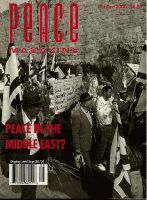
Peace Magazine Oct-Dec 2000, page 23. Some rights reserved.
Search for other articles by Rene Wadlow here
In June, Geneva was the world capitol of discussion and planning for social development as the U.N. General Assembly met to consider implementing the Outcome of the World Summit for Social Development and Further Initiatives. That summit had taken place in Copenhagen, 6-12 March 1995 and so this review was familiarly called "Copenhagen plus five."
Switzerland with the United Nations and NGOs, had organized an extensive series of seminars and discussions under the general heading "Geneva 2000." The intellectual discussions were made lighter by concerts, art exhibitions, dances and a boat ride all facilitating informal contacts among the participants.
Some Swiss authorities feared violence at the meetings on the lines of demonstrations at Seattle and Washington, DC. Thus, on the first days, there were large police reserves waiting on side streets in Geneva near the headquarters of the United Nations and its Specialized Agencies. However, the "spirit of Geneva" is one of compromise and respectful discussion. This spirit characterized the events, which provided opportunities for face-to-face meetings of NGOs, helping to break through any single issue focus.
Among the key social development issues discussed were security, welfare and identity questions.
One feature that was relatively new to U.N. meetings was the open discussion of values and spiritual approaches to social development. This came in part from the active and cooperative role that the Baha'i and the Brahma Kumaris played in the parallel sessions of the Geneva 2000 Forum. The spirit of these parallel meetings flowed over to the U.N. General Assembly. As NGOs have already recognized, social development rests upon a vision of the good life and of the potential for the full development of each person. It is not a set of specific structures or policies.
However, this view of development as the creation of conditions conducive to the full realization of persons has never been fully articulated in a U.N. document. Theoretical analysis is not a U.N. strong point, and NGOs working at U.N. meetings follow the writing style of governments when making their own collective declarations. The resolutions arising from large U.N. conferences are typically shopping lists, with something for everyone, so that consensus can be reached without a vote. Still, a few governments will always make reservations on the wording. Thus at the end of the Geneva review, Costa Rica, Malta, and the Holy See all insisted that universal access to health care did not include abortion.
A New StyleThe closest approximation of the concept of development as an "enabling environment" is in both the "Beijing plus five" final resolution and in the paragraphs concerning women in the Geneva review. Instead of portraying women as only the victims of men, the majority vision has come to portray women as dynamic and fully capable of fulfilling their potential if the impediments are removed from the development process (e.g. the patriarchal norms, values and structures). The Montreal-based International Council on Social Welfare was important in the follow-up to the Copenhagen conference, stressing ways to make the broad commitments of governments operational. Its journal Social Development Review has published important exchanges on policy considerations. The ICSW president, Julian Disney, has called for action, stressing that the United Nations Economic and Social Council should play a leadership role in co-ordination of world social policy.
René Wadlow is editor of Transnational Perspectives and NGO representative to the United Nations, Geneva.

Peace Magazine Oct-Dec 2000, page 23. Some rights reserved.
Search for other articles by Rene Wadlow here